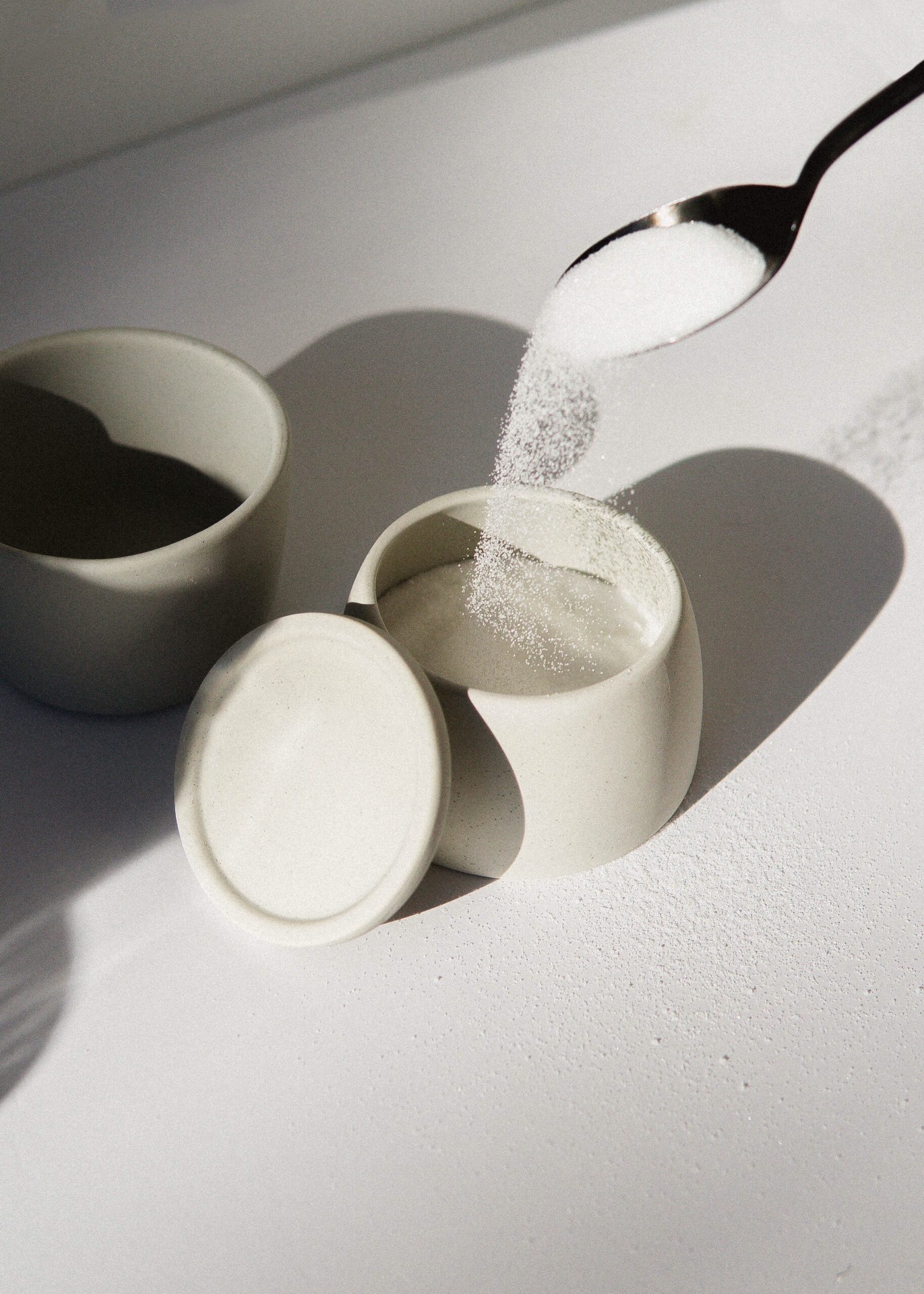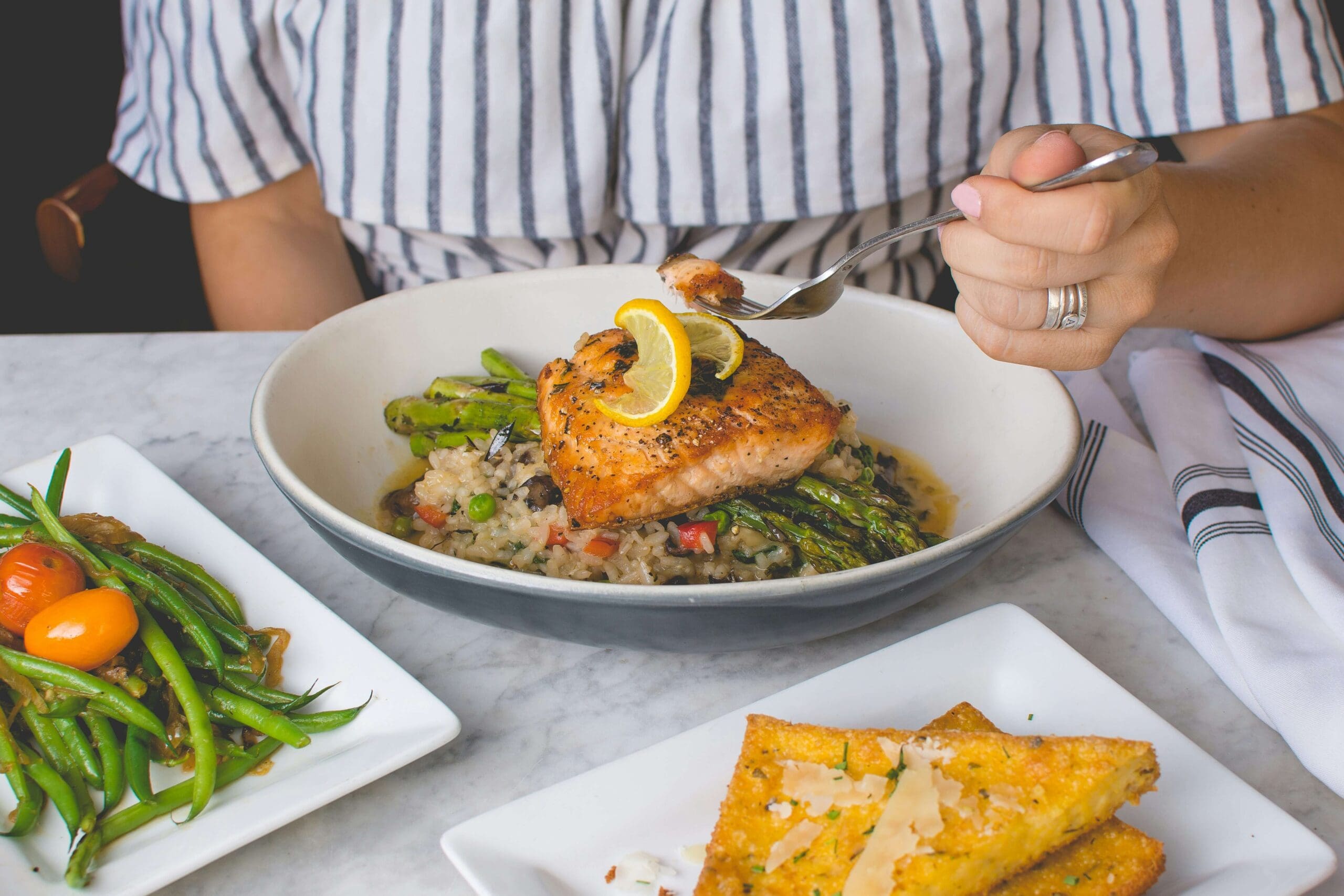The moment someone hears a cancer diagnosis, everything changes. Suddenly food becomes the enemy. I’ve watched survivors spiral into panic about birthday cake, fruit, and even whole grain bread.
The fear starts with one phrase: sugar cause cancer. As your oncology dietitian, I need to tell you something important.
This myth has caused more harm than almost any other piece of nutrition misinformation out there. Cancer is terrifying enough without adding unnecessary food fear to your plate.
In this article, I’m breaking down the science behind sugar and cancer, explaining what actually matters for your health, and giving you the evidence-based truth so you can stop second-guessing every bite.
Get Your Free Clean Scan Plan!
Tired of conflicting advice about what you can and can’t eat? My 5 pillar guide offers practical, immediate guidance, replacing fear and confusion with clarity and confidence.
The Direct Answer: Does Sugar Cause Cancer?
No, sugar does not specifically feed cancer cells in a way that makes them grow faster or causes cancer to spread. Every single cell in your body uses glucose for energy, including healthy cells, brain cells, muscle cells, and yes, cancer cells.
There is no way to selectively starve cancer cells of sugar without also starving every other cell in your body. The relationship between sugar and cancer is real, but it’s indirect.
Excess sugar consumption leads to weight gain, and obesity increases the risk of different types of cancer. It’s the extra body fat, not the sugar itself, that creates an environment where cancer risk increases.
Want expert advice on oncology nutrition tailored just for you? Apply for our VIP 1:1 coaching!
The Sugar and Cancer Myth: Where It Came From
This myth originated from a fundamental misunderstanding of how cancer cell metabolism and PET scans work.
A PET scan (positron emission tomography) doesn’t detect sugar feeding cancer – it measures metabolic activity using a radioactive glucose analog called fluorodeoxyglucose (FDG). FDG is a modified form of glucose that cells absorb just like normal sugar, but once inside the cell, it gets “trapped” because it can’t be fully metabolized.
When FDG is injected into the bloodstream, cells that are highly metabolically active like cancer cells take up more of it. On the scan, these areas appear bright because they’re using large amounts of energy.
This has led to the misconception that sugar “feeds” cancer. In reality, cancer cells light up not because sugar directly causes their growth, but because they have accelerated metabolic rates and consume more energy from all sources – glucose, amino acids, and fatty acids alike.
Your healthy cells also depend on glucose at all times, especially the brain and red blood cells. Eliminating sugar from your diet won’t “starve” cancer -it would simply deprive your entire body of the energy it needs to function.
As your cancer dietitian, I see survivors cutting out fruit, whole grains, and even vegetables because they contain natural sugars. One of my clients came to me eating only meat and eggs because she was terrified any carbohydrate would bring her cancer back.
She was exhausted, losing muscle, and her bloodwork showed dangerous nutrient deficiencies. In my programs, I teach survivors how to eat for cancer prevention using The Cancer Prevention Bundle without the restriction and fear.
Understanding PET Scans: The Real Story
A PET scan (Positron Emission Tomography) uses a radioactive tracer called FDG that’s structurally similar to glucose. All cells absorb FDG because they can’t tell the difference between it and regular glucose.
The bright spots on a PET scan show metabolic activity, not cancer being “fed” by sugar. Cancer cells take up more FDG because they have a higher metabolic rate due to rapid, uncontrolled growth.
But your brain, heart, liver, and kidneys also light up because they’re metabolically active organs. The scan is a diagnostic tool that helps doctors locate tumors and assess treatment effectiveness. It does not prove that eating sugar causes cancer or makes it grow faster.
Just because cancer cells use glucose for energy does not mean you can control cancer growth by eliminating sugar from your diet. Your body maintains blood glucose levels within a very narrow range no matter what you eat.
If you stop eating carbohydrates entirely, your liver will make glucose from protein and fat. Cancer cells will always find fuel because they’re programmed to survive under any conditions.
Your Next Step Toward a Stronger, Healthier Future
You don’t need to do it perfectly – you just need the right direction. The Clean Scan Plan helps you protect your health and reduce recurrence risk with clarity, compassion, and real-world guidance.
The Warburg Effect: Cancer Cell Metabolism
In the 1920s, scientist Otto Warburg discovered that cancer cells metabolize glucose differently than healthy cells using a process called aerobic glycolysis.
Cancer cells take a shortcut by breaking down glucose quickly to get energy fast, supporting their rapid growth. The rate of energy production is 10 to 100 times faster than the normal process.
This speed advantage helps cancer cells divide and multiply rapidly. But cutting sugar doesn’t stop this process. Cancer cells will find energy from whatever is available in your body.
Research shows that cancer cells can use protein, fat, and even dead cancer cells for fuel. You cannot win a race to starve cancer because cancer adapts faster than you can restrict nutrients.
Can You Starve Cancer by Cutting Out Sugar?
I’ve had clients come to me after months of restriction – terrified to eat the very foods that could help them heal. They’ve cut out fruit, whole grains, beans, and even vegetables that actually support recovery. By the time we meet, they’re exhausted, losing strength, and wondering why their immune system feels weaker, not stronger.
In VIP 1:1 coaching, we rebuild your nutrition and confidence piece by piece – so food stops feeling like the enemy and starts becoming part of your recovery again. Inside VIP 1:1 coaching, we rebuild from the inside out – bringing food, strength, and peace back into their body again.
Cancer does not change because of dietary restriction nor does it control cancer growth. Major cancer centers including MD Anderson, Memorial Sloan Kettering, and the American Institute for Cancer Research all confirm: there is no evidence that cutting sugar from your diet prevents cancer or stops cancer growth.
What matters is overall diet quality, maintaining a healthy weight, staying physically active, and following your medical treatment plan.
During cancer treatment, your body needs adequate calories and nutrients to heal. Cutting out entire food groups leads to malnutrition that weakens your body, muscle loss that makes recovery harder, immune suppression when you need immune function for treatment, and increased anxiety around food.
As your oncology dietitian, I help survivors rebuild their relationship with food while following evidence-based nutrition that actually supports cancer prevention and recovery.
Types of Sugar: What Actually Matters?
Natural sugars found in fruits, vegetables, and whole grains come packaged with fiber, vitamins, minerals, and antioxidants. These nutrients protect against cancer rather than promoting it. Added sugars provide empty calories with zero nutritional benefit.
They’re found in sugar-sweetened beverages, desserts, candy, condiments, and processed foods with hidden sugars. Fiber intake is associated with reduced cancer risk, particularly for colorectal and breast cancer.
When survivors cut out all carbs to avoid sugar, they’re also eliminating protective fiber, which is counterproductive to cancer prevention.
Sugar hides under more than 60 different names on ingredient lists. Look for words ending in “-ose” like fructose, sucrose, maltose, and dextrose.
Other names include high fructose corn syrup, agave nectar, and cane juice. If sugar appears in the first three ingredients, that product is high in added sugar.
What Cancer Patients and Survivors Should Actually Do?
As your cancer dietitian, here’s what I tell every client: food is not the enemy. Restrictive eating creates more problems than it solves. Instead of eliminating sugar completely, focus on:
- Whole food nutrition with plenty of vegetables, fruits, whole grains, and lean proteins
- Limiting added sugars from processed foods and sugary drinks
- Managing portion sizes to maintain a healthy weight
- Enjoying treats occasionally without guilt or fear
- Staying physically active to support overall health
The American Institute for Cancer Research provides clear guidelines: fill two-thirds of your plate with plant-based foods, choose whole grains over refined grains, limit red meat and avoid processed meats, drink water instead of sugary beverages, aim for 150 minutes of exercise weekly, and maintain a healthy body weight. In my programs, I show survivors how to implement these recommendations without the overwhelm.
One of my clients was celebrating her one-year remission anniversary with her favorite dessert but was paralyzed with anxiety about eating it. We worked through her fears, and she enjoyed that dessert surrounded by the people she loves.
She’s now three years cancer-free and no longer lives in fear of birthday cake. Occasional treats in the context of an overall healthy diet do not increase cancer risk or cause recurrence.
Ready to Feel Confident About Your Nutrition Choices?
Join thousands who’ve transformed their relationship with food after cancer using our Clean Scan Plan.
Yes! Send Me the Free Clean Scan Plan
Common Questions Your Oncology Dietitian Answers
Should Cancer Patients Avoid Sugar?
No, cancer patients should not avoid sugar completely. Your body needs glucose for energy, especially during treatment. What matters is choosing quality carbohydrate sources like fruits and whole grains while limiting added sugars from processed foods. Completely eliminating carbohydrates can lead to malnutrition, muscle loss, and compromised immune function when you need strength most.
Which Is Worse for Cancer: Sugar or Alcohol?
Alcohol is definitively worse for cancer risk than sugar. Alcohol is a known carcinogen that directly damages DNA and increases risk for multiple cancers including breast, liver, colorectal, and esophageal cancer. Sugar’s impact on cancer is indirect through weight gain. The American Institute for Cancer Research recommends eliminating alcohol consumption, with no amount being completely safe for cancer prevention.
Do Cancer Cells Feed on Sugar?
All cells in your body, including cancer cells, use glucose for energy. Cancer cells consume glucose at a faster rate because they’re rapidly dividing, but they also use amino acids from protein and fatty acids from fat. There’s no way to selectively deprive cancer cells of glucose without also affecting every healthy cell. Your brain, heart, muscles, and every organ need glucose to function.
The Bottom Line: What the Science Really Says
After years of working with cancer survivors as your oncology dietitian, I can tell you with certainty: the sugar feeds cancer myth causes more harm than good. The science is clear that sugar does not directly cause cancer or make it grow faster.
What matters is your overall dietary pattern, maintaining a healthy weight, staying active, and following evidence-based nutrition. My clients don’t just read about cancer prevention. They live it with my support, free from food fear and restriction.
They enjoy meals with their families, celebrate special occasions without anxiety, and feel confident in their choices because they understand what actually matters.
You don’t need to eat perfectly after cancer – you just need the right direction. The Clean Scan Plan helps you protect your health and reduce recurrence risk with clarity, compassion, and real-world guidance.
References
- https://www.mskcc.org/news/no-sugar-no-cancer-look-evidence
- https://www.aicr.org/news/the-sugar-cancer-connection/
- https://www.mdanderson.org/cancerwise/does-sugar-cause-cancer-.h00-159775656.html
- https://my.clevelandclinic.org/health/diagnostics/10123-pet-scan
- https://www.cancer.gov/news-events/cancer-currents-blog/2025/fructose-tumor-growth-liver-lipids
- https://pmc.ncbi.nlm.nih.gov/articles/PMC4783224/
- https://pmc.ncbi.nlm.nih.gov/articles/PMC9775518/






